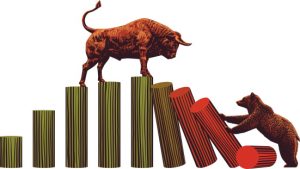The Stock Market

Bull and Bear -Stock Market Trends
“If I had known that the ride was going to be like this, I would have taken more Dramamine!”
I remember hearing those words from a fellow passenger on a deep-sea fishing boat in the Gulf of Mexico – a world away from the Rocky Mountains and Loveland foothills.
What started out as a calm, sunny day in the harbor at Port Aransas, Texas transformed into a nauseating journey through rolling swells and darkening skies.
The markets sometimes feel like that!
A few weeks ago the sun was shining and the markets were rising. By the end of last week, the winds picked up, the waves swelled, and we started looking around for the Dramamine – again.
As I write this blog about investing in the stock market, the Dow is up 180 points, the NASDAQ is up 73 points, and the S&P 500 is up 21 points. So, we’ve recovered some of declines from last week.
You’ve heard me say it – but it’s worth repeating: the stock markets ascend on an escalator and descend on an elevator. Why? Because fear is a powerful motivator and market selloffs are often emotional in nature.
After enduring a rough ride that day on the Gulf, the winds subsided, the clouds cleared, and the sea calmed. We rigged up the fishing rods, baited the hooks, and enjoyed a day of sunshine and King fish. Most of us caught our limit of fish – and shared with others.
The markets are like that too. If we ride out the storms, we reap the rewards.
When thinking about investing, start with the end in mind.
Investing in the stock market – whether only in the US market, only in international markets, or in the global markets – is about investing in companies. Keep that in mind.
Whether we’re buying individual stocks, shares in an active mutual fund, or shares in a passive index-tracking ETF, we’re ultimately investing in companies.
If a friend started a new business and asked you to consider investing in that business, you would more than likely consider that investment as “long-term” – meaning that you wouldn’t expect your initial investment back within a few weeks, months, or even years. After reviewing your friend’s business plan, financial statements, and general economic conditions, you might decide to buy stock in the company.
You would view that investment as a place to commit some of your hard earned money in a company with good prospects for productive growth – and potentially some dividends. Most of us wouldn’t view it as gambling.
It’s no different with our investments in the global stock markets. We take the time to do some research, determine how the company or fund will fit into our general investment strategy, consider the role the investment will play in reaching our financial life goals, and make a decision on whether or not to invest – based a set of principled, well reasoned criteria. We work hard for our money and don’t want to simply wing-it when it comes to our investments.
That being said, we invest with the end in mind. Meaning, when do we need to begin receiving money back from the investment – either in the form of dividends, capital gains, or the original invested capital? The more time we have until we need money from the investment, the more patient we can be.
If we need money sooner ( a few years) rather than later (many years) from the investment, we should think carefully about whether it’s the right place for our money.
So ask yourself this question: do I have money set aside so that I can be patient and wait for this investment to grow and produce?
If your answer is, “no” – then reconsider how you will invest your money.
Why? Because investments in companies, both in the US and abroad, should be considered in a scope of years – not months, weeks, or days.
Only invest in what you understand

There are a myriad of investment options. Consider only those investments that make sense to you.
If derivatives, options, warrants, futures… and so on all sound Greek to you – then don’t invest in them.
Don’t let someone else talk you into investing in something that they understand but you don’t. It’s your hard earned money. Better off making a potential 8% average return in an investment that you can explain to a friend rather than a potential 12% in an investment that is confusing to you.
Be careful when it comes to making an investment in a private placement or anything that locks up your money for periods of time. If you can’t get your money out when you need it, do you have other sources to draw on?
Don’t invest in annuities!
If you are looking for a financial planner in the Loveland area – or you live anywhere along the Front Range – and are uncertain about your investments, consider making a complimentary appointment with me.
